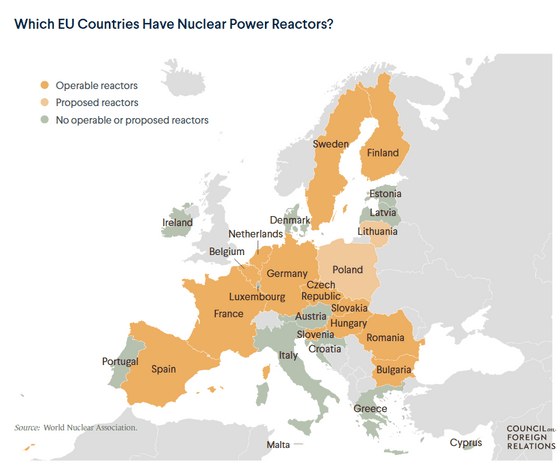What is happening to the 'nuclear power' debate in Europe, which is shaken by Russia's invasion of Ukraine?

While nuclear power generation, which does not emit greenhouse gases, has received a great deal of attention as a measure against climate change, the unstable international situation triggered by Russia's
Could Nuclear Power Cut Europe's Dependence on Russian Energy? | Council on Foreign Relations
https://www.cfr.org/in-brief/could-nuclear-power-cut-europes-dependence-russian-energy
France to build up to 14 new nuclear reactors by 2050, says Macron | France | The Guardian
https://www.theguardian.com/world/2022/feb/10/france-to-build-up-to-14-new-nuclear-reactors-by-2050-says-macron
In November 2021, French President Emmanuel Macron announced a policy to expand nuclear power generation. In February 2022, we published a concrete plan to build up to 14 new reactors by 2050. According to The Guardian, a major British newspaper that reported this, France Electric , which owns all nuclear power plants in France, has decided to build at least six new reactors and eight more. It is said that the construction plan is underway.
President Macron has positioned this announcement as a 'renaissance of the French nuclear industry', which is a major shift in the policy of denuclearization that was promised at the time of his inauguration, and will achieve carbon neutrality by 2050 by eliminating the dependence on fossil fuels. Claims to be important above.
In Europe, nuclear power is being reassessed for geopolitical reasons in addition to climate change measures. Following the energy problems triggered by Russia's invasion of Ukraine, Belgium has announced an extension of the operation period of two reactors that had been decided to be decommissioned in 2025. Finland is also starting a new reactor operation for the first time in 40 years.
A new nuclear reactor was constructed in Finland for the first time in about 40 years and trial operation started --GIGAZINE

by IAEA Imagebank
European countries are rushing to start operations and expand nuclear power plants because of the growing sense of crisis about their dependence on Russia for energy. According to the CFR, 47% of the EU's imported coal and solid fuels, 41% of natural gas and 27% of crude oil come from Russia. Therefore, there are concerns that if Russia cuts off its energy supply to the EU in retaliation for sanctions against the invasion of Ukraine, it could lead to a serious energy crisis.
Below is a map showing the operational status of nuclear power plants in the EU. Countries with operational nuclear power plants are shown in dark orange, and countries with nuclear power plants that are under consideration for restart are shown in light orange. Regarding the reason why the EU is reviewing nuclear energy, the CFR said, 'About half of EU countries have nuclear power plants. Normally, most reactors are not in full operation, so the power generation of existing reactors The amount can be increased relatively quickly, which is also one of the solutions proposed by the International Energy Agency (IEA) to reduce the dependence of Russian natural gas in Europe. '
On the other hand, some EU countries have remained opposed to the promotion of nuclear power. For example, in Germany, which decided to completely abolish domestic nuclear reactors in the wake of the 2011 Fukushima Daiichi nuclear power plant accident , a plan to extend the decommissioning deadline following the invasion of Ukraine emerged, but it was finally rejected . it was done. According to the CFR, in addition to Germany, Austria, Luxembourg and Portugal are also cautious about nuclear power plants. In these countries, the cost of building and maintaining nuclear power and the problem of radioactive waste are the main causes of opposition to nuclear power.
Russia's invasion of Ukraine also raised concerns about a nuclear disaster. At the Chernobyl nuclear power plant in Ukraine occupied by the Russian army, communication and external power supply were temporarily cut off , and at the Zaporizhia nuclear power plant, which is the largest nuclear power plant in Europe, the Russian army fired. There is also a fire caused by.
Allison Macfarlane, director of the Institute for Public Policy and World Affairs, University of British Columbia, told the CFR, 'I realized that the war woke everyone up and that the nuclear power plant was not designed to withstand the war.' Did.
Related Posts:
in Note, Posted by log1l_ks







